Suzuki Ignis
The Suzuki Ignis (Japanese: スズキ・イグニス, Hepburn: Suzuki Igunisu) is an automobile nameplate that was first produced by Suzuki in 2000 as a subcompact car, replacing the Suzuki Cultus, and subsequently as a crossover-styled city car from 2016.
| Suzuki Ignis | |
|---|---|
 2018 Suzuki Ignis SZ5 (UK) | |
| Overview | |
| Manufacturer | Suzuki |
| Production | 2000–2008 2016–present |
| Body and chassis | |
| Class |
|
| Layout | Front-engine, front-wheel-drive or four-wheel-drive |
The Cultus retailed under various names globally, notably as the Suzuki Swift. While the Cultus-based Swift was replaced by the Ignis in Europe and Australasia, Japanese models were in fact badged Suzuki Swift—thus debuting the "Swift" name in that market. The word "ignis" is Latin for "fire".
As a result of a venture project between General Motors (GM) and Suzuki, the Ignis, from 2001 also formed the basis of the Chevrolet Cruze. The Cruze sold throughout Japan as a Chevrolet, with Australasian-market versions badged Holden Cruze. From 2003, Suzuki of Europe adopted a lengthened version of the Cruze as the Suzuki Ignis—representing a facelift of the original Ignis. In the same year, Subaru adopted the car as the Subaru G3X Justy, also exclusive to Europe.
First generation (FH/MH; 2000)
First series (FH; 2000)
| First series (FH) | |
|---|---|
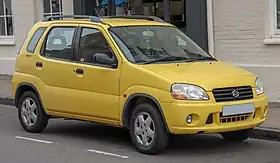 2000–2003 Suzuki Ignis GL 5-door (UK) | |
| Overview | |
| Also called | Suzuki Swift (Japan) |
| Production | 2000–2008 |
| Assembly | Japan: Kosai, Shizuoka |
| Designer | Hiroshi Tsuburai (Ignis Sport)[2] |
| Body and chassis | |
| Body style | 3/5-door hatchback |
| Related | Suzuki Kei |
| Powertrain | |
| Engine | |
| Transmission | |
| Dimensions | |
| Wheelbase | 2,360 mm (92.9 in) |
| Length | 3,615 mm (142.3 in) |
| Width | 1,595 mm (62.8 in) 1,650 mm (65.0 in) (Sport) |
| Height |
|
| Kerb weight | 880–960 kg (1,940.1–2,116.4 lb) |
| Chronology | |
| Predecessor | Suzuki Swift/Cultus hatchback |
| Successor | Suzuki Swift (international) |
The first series of the Ignis (codenamed HT51S and HT81S) was manufactured as a three- and five-door hatchback, powered by a new generation of Suzuki inline-four petrol engines, the M family. This family featured DOHC, four valves per cylinder and variable valve timing. Engines were offered in two displacements: 1.3 litres (M13A) and 1.5 litres (M15A), with power outputs of 65 kW (88 PS; 87 hp) (JIS) and 81 kW (110 PS; 109 hp) (JIS), respectively. Suzuki assigned the HT51S model code to the 1.3-liter model, with the 1.5-liter versions allocated the HT81S code.[3] With exception of the Ignis Sport, Suzuki did not offer the three-door model in Japan. Likewise, the 1.5-liter engine was unavailable outside of the Ignis Sport range in export markets, with the 1.3-litre version offered being detuned to 61 kW (83 PS; 82 hp). The standard transmission was a five-speed manual, with a four-speed automatic transmission optional. Both the front- and all-wheel drive layouts were tendered, although the combination of four-wheel drive and automatic transmission combination was limited to Japan as it was incompatible with European emission standards. A minor facelift came in 2003, featuring new wheel trims, a revised grille insert and clear headlamp-mounted turn signal lenses, as opposed to the amber versions fitted to the original. Production ended in 2006.
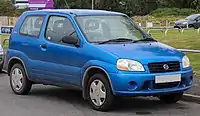 2000–2003 Suzuki Ignis GL 3-door (UK)
2000–2003 Suzuki Ignis GL 3-door (UK) 2000–2003 Suzuki Ignis GL 5-door (UK)
2000–2003 Suzuki Ignis GL 5-door (UK).JPG.webp) 2000–2003 Suzuki Swift 5-door (Japan)
2000–2003 Suzuki Swift 5-door (Japan) 2003–2006 Suzuki Swift 5-door (Japan)
2003–2006 Suzuki Swift 5-door (Japan)
Sport
Following its use in the 2002 World Rally Championship season, Suzuki introduced the Ignis Sport in 2003, a performance-oriented version based on the three-door body style. Badged the "Swift Sport" in Japan, the performance model utilised the same 1.5-litre engine as the regular car, but with power increased to 85 kW (116 PS; 114 hp). The engine was slightly detuned for the European market, to 80 kW (109 PS; 107 hp). The car featured a number of modifications, including a body kit, lowered and firmer suspension, close ratio gear box and tuned exhaust. The Sport has the roof bars removed which were standard on the normal Ignis. Recaro sport seats are included in the cabin, white instrument dials with blue illumination and carbon effect panels to increase its sporty appeal. The Ignis Sport can accelerate from 0–100 km/h (0–62 mph) in 8.9 seconds and has a top speed of 185 km/h (115 mph). The Sport ceased production in 2005. It was only available in a limited selection of colours: red, blue, silver, black and yellow. Various optional extras were available including metallic pedals, driving lights in the bumper and front mesh grille.
_front.jpg.webp) 2003 Suzuki Swift Sport 3-door
2003 Suzuki Swift Sport 3-door_rear.jpg.webp) 2003 Suzuki Swift Sport 3-door
2003 Suzuki Swift Sport 3-door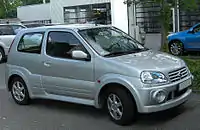 2003–2005 Suzuki Ignis Sport 3-door
2003–2005 Suzuki Ignis Sport 3-door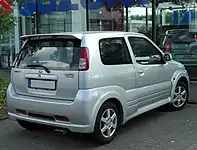 2003–2005 Suzuki Ignis Sport 3-door
2003–2005 Suzuki Ignis Sport 3-door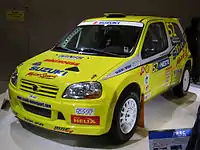 Suzuki Ignis Sport S1600 rally car
Suzuki Ignis Sport S1600 rally car
Second series (MH; 2001)
Chevrolet Cruze
| Second series (MH) | |
|---|---|
_front_(cropped).jpg.webp) Chevrolet Cruze 1.3 LS (Japan) | |
| Overview | |
| Also called |
|
| Production | |
| Assembly |
|
| Body and chassis | |
| Class | Subcompact car (B) |
| Body style | 5-door hatchback |
| Related | Suzuki Kei |
| Powertrain | |
| Engine | |
| Transmission | |
| Dimensions | |
| Wheelbase | 2,360 mm (92.9 in) |
| Length |
|
| Width | 1,640 mm (64.6 in) |
| Height | 1,565–1,610 mm (61.6–63.4 in) |
| Kerb weight | 940–990 kg (2,072.3–2,182.6 lb) |
| Chronology | |
| Predecessor |
|
| Successor |
|
_rear.jpg.webp)
_wagon_(2010-07-19)_01.jpg.webp)
_wagon_(2010-07-19)_02.jpg.webp)
Revealed as the Chevrolet YGM1 concept car at the 33rd Tokyo Motor Show in 1999, the Chevrolet Cruze (codenamed HR51S and HR81S) derived from the Suzuki Ignis.[4][5] The development of the Cruze departed from the original five-door hatchback Suzuki as a sport utility vehicle (SUV).[6][7] Despite the Chevrolet branding, the YGM1, like the production car, was the work of GM's Australian arm, Holden. The YGM1 design team were given just 12 weeks to conceive the concept, styled by Peter Hughes under the direction of Holden's then chief designer, Michael Simcoe.[8][9] The revamped interior was done under the direction of Jenny Morgan-Douralis, Holden's chief colour and trim designer at the time.[10] Along with the styling, Holden also executed most of the engineering work and were responsible for devising the "Cruze" nameplate.[4]
GM revealed the production Cruze on 22 October 2001 with a 1 November sales commencement date in Japan.[7] Significantly, the Cruze marked GM's return to Japanese manufacturing for the first time since 1939,[11] with production located at Suzuki's plant in Kosai, Shizuoka.[12] In terms of design, the production version differs slightly from the YGM1: the flared fenders were toned down, and in lieu of the concept's 17-inch alloy wheels, 15-inch wheels were fitted. High-mounted wrap-around tail lights are featured at the rear, with dual circular brake lights set into the bumper—as carried over from the concept.[8]
Powertrains are identical to those fitted to the Suzuki, with 1.3- and 1.5-litre inline-four engines offered and coupled to either a five-speed manual or four-speed automatic transmission.[7][13][14] The M13A-equipped models were given the model code HR51S, with the M15A versions designated HR81S.[13][14] The 1.3-litre was rated at 65 kW (88 PS; 87 hp) and 118 N⋅m (87 lbf⋅ft),[15] while the 1.5-litre delivered 73 kW (99 PS; 98 hp) and 143 N⋅m (105 lbf⋅ft).[7] Both front- (FWD) and all-wheel drive (AWD) layouts were offered, the all-wheel system being an electronically-controlled setup. This system utilises an electromagnetic controlling device that receives signals from the anti-lock braking system. Both the 1.3 and 1.5 models could be specified with either FWD or AWD.[7]
To maximise sales penetration, Japanese-market Cruzes were sold at both GM AutoWorld and Suzuki Arena sales channels. AutoWorld dealerships stocked the 1.5-litre car in LS and LT trims, with the 1.3 confined to Suzuki's Arena, available in E and X trims.[13][14][16] The vehicle was also in compliance with Japanese government dimension regulations to capitalize on the associated tax benefits to further encourage sales.
After a delay triggered by unfavourable exchange rates from Japan,[4] Holden introduced the Cruze to the Australian market on 1 July 2002.[17] New door trims were fitted and the rear window wiper was made standard from January 2004 production.[18] Holden discontinued the Cruze after January 2006.[19] The Chevrolet version in Japan continued on until 2008.
Suzuki Ignis (2003 facelift)
Suzuki of Europe utilised the Cruze modifications as an update of the Ignis in 2003.[20] Suzuki extended the Cruze's length by 145 millimetres (5.7 in), to improve interior room and luggage space.[21][22] This version was manufactured specifically for the European market in Esztergom, Hungary by Magyar Suzuki.[23] Suzuki in Japan did not utilise the Cruze modifications for its own Suzuki-badged model due to the presence of the Chevrolet version in that market.
The 1.3-litre version came as manual FWD, with the 1.5-litre manufactured in FWD form with both manual and automatic transmission, or as a manual transmission AWD via viscous coupling. Also, a diesel version was available, powered by Fiat's 1.3-litre Multijet engine.[24]
An arrangement with Subaru resulted in the Hungarian-manufactured Ignis being sold alongside the Suzuki-badged model in Europe as the Subaru G3X Justy.[25] Apart from the slightly larger fog lights, different front bumper and grille, plus badging—the Subaru was identical to the Suzuki.[26][27] Subaru debuted the Justy at the Frankfurt Motor Show in September 2003, going on sale immediately after.[28] Two AWD drive models were available—1.3- and 1.5-litre petrols; there was also a FWD, 1.3-litre turbocharged diesel model.[28] The G3X Justy was not sold in United Kingdom or Ireland in right-hand-drive. The G3X Justy was transferred in 2007 to the Daihatsu Boon/Sirion (M300).[29]
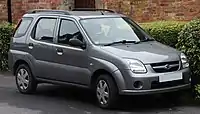 2007 Suzuki Ignis GL (UK)
2007 Suzuki Ignis GL (UK)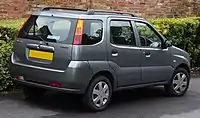 2007 Suzuki Ignis GL (UK)
2007 Suzuki Ignis GL (UK) Suzuki Ignis S1600 rally car
Suzuki Ignis S1600 rally car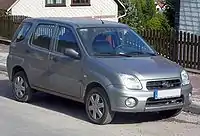 2003–2007 Subaru G3X Justy
2003–2007 Subaru G3X Justy
Second generation (MF; 2016)
| Second generation (MF) | |
|---|---|
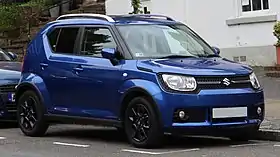 2017 Suzuki Ignis SZ-T (UK; pre-facelift) | |
| Overview | |
| Production | 2016–present |
| Assembly |
|
| Designer | Yoshio Takeuchi[30] Takumi Arita and Yuta Watanabe (facelift)[31] |
| Body and chassis | |
| Class | Crossover city car (A) |
| Body style | 5-door SUV |
| Layout | Front-engine, front-wheel-drive or four-wheel-drive "AllGrip" |
| Platform | HEARTECT A platform[32] |
| Related | |
| Powertrain | |
| Engine |
|
| Electric motor | WA05A |
| Transmission |
|
| Hybrid drivetrain | SHVS Mild Hybrid System |
| Dimensions | |
| Wheelbase | 2,435 mm (95.9 in) |
| Length | 3,700 mm (145.7 in) |
| Width | 1,660–1,690 mm (65.4–66.5 in) |
| Height | 1,595–1,605 mm (62.8–63.2 in) |
| Kerb weight |
|
| Chronology | |
| Predecessor | Suzuki Splash/Maruti Ritz |
On 3 March 2015, Suzuki released details of a small 4WD concept car, called the "Suzuki iM-4" at the 85th Geneva International Motor Show.[34] On 30 October 2015, the production version, known as the Ignis was exhibited at the 44th Tokyo Motor Show.[35]
On 21 January 2016, Suzuki officially announced the launch of the Ignis for the first time in the Japanese market.[36] The car is powered with two versions of the 1.25-litre K12C inline-four engine: a standard petrol and a mild hybrid with 3Ah lithium-ion battery placed under the front passenger seat to store energy and incorporates an idle stop function operated via the Integrated Starter Generator (ISG).[37] The hybrid components add only 6.2 kg (14 lb) to the overall weight of the car.[37] The engine produces 91 PS (67 kW; 90 hp) and 118 N⋅m (87 lb⋅ft) of torque. The mild hybrid motor produces 3.1 PS (2.3 kW; 3.1 hp) and 50 N⋅m (37 lb⋅ft) of torque. The engine is mated to 5-speed manual and CVT, both available for FWD and AWD configuration.
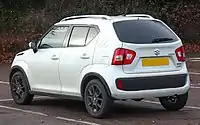 2018 Suzuki Ignis SZ5 (UK; pre-facelift)
2018 Suzuki Ignis SZ5 (UK; pre-facelift).jpg.webp) Interior
Interior
Europe
The European-spec Ignis is almost similar as Japanese-spec. Powered with the same 1.25-litre petrol and mild hybrid engines.[38] The European-spec produces 1 PS (0.7 kW; 1.0 hp) less and 2 N⋅m (1.5 lb⋅ft) more than Japanese-spec.[37] The mild hybrid system produces the same output as Japanese-spec.[37] The transmission available is a 5-speed manual or automated-manual dubbed as "Auto Gear Shift (AGS)" rather than CVT.[37] The AWD option is only available with manual transmission. On 8 January 2018, a special edition with adventure-oriented accessories was launched in the UK.[39]
India
The Indian-spec is known as Maruti Suzuki Ignis. It was launched as a replacement for the Maruti Suzuki Ritz, manufactured by Maruti Suzuki and sold through the company's NEXA chain of premium dealerships.
It was offered with a 1.25-litre D13A DDiS 190 turbo-diesel engine that produces 75 PS (55 kW; 74 hp) and 190 N⋅m (140 lb⋅ft) of peak torque which also powered the Swift and the Baleno in India. The diesel option was discontinued in 2018.[40] The other engine offered with the Indian-spec car is a 1.2-litre K12M unit that develops 82 PS (60 kW; 81 hp) and 113 N⋅m (83 lb⋅ft) of torque. Both these engines are available with either a 5-speed manual or a 5-speed automated manual transmission.
In 2016, the Indian Ignis contains 95% local parts.[41]
Indonesia
The Indonesian-spec Ignis was launched by Suzuki Indomobil Motor on 17 April 2017 as an import from India.[42][43] It is available in two trim levels: GL and GX, with either 5-speed manual or automated manual transmission. On 27 January 2018, a special edition with sport-oriented accessories was launched for Indonesian market, based from GL trim known as Ignis Sport Edition.[44]
Facelift
The facelifted second generation Ignis was launched in Japan on 4 February 2020, in India on 7 February 2020 at the 15th Auto Expo, in Indonesia on 9 April 2020,[45] in Australia in May 2020[46] and in the United Kingdom in August 2020.[47] The car received new front and rear bumpers, gauge cluster colour and fabric seats design.
European-spec Ignis received a brand new 1.2-litre dual VVT mild hybrid engine called K12D Dualjet and become standard engine replacing the previous 1.25-litre engine, it is now produces 83 PS (61 kW; 82 hp) and 107 N⋅m (79 lb⋅ft).[48] The battery capacity for mild hybrid system is also enlarged to 10Ah.[48] The automated manual "AGS" transmission is also replaced with CVT.[48]
_Facelift_IMG_4450.jpg.webp) 2021 Suzuki Ignis Hybrid (Germany; facelift)
2021 Suzuki Ignis Hybrid (Germany; facelift).jpg.webp) 2020 Suzuki Ignis GL (Australia; facelift)
2020 Suzuki Ignis GL (Australia; facelift)
Sales
| Year | Japan | India | Europe[49] | Indonesia | Mexico[50] |
|---|---|---|---|---|---|
| 2016 | 24,261[51] | 1,602 | |||
| 2017 | 11,264[52] | 48,285[53] | 41,166 | 14,157[54] | 3,401 |
| 2018 | 5,995[51] | 43,602[55] | 43,774 | 13,802[56] | 5,475 |
| 2019 | 3,678[51] | 22,340 | 38,091 | 5,138[57] | 5,730 |
| 2020 | 2,647[51] | 27,200[58] | 37,568 | 1,893[59] | 5,158 |
| 2021 | 2,437[51] | 32,735[60] | 42,206 | 1,932[61] | 5,748 |
| 2022 | 904 | 6,901 |
Notes
- Auto Gear Shift (AGS). In the Indian, Indonesian, European (pre-facelift) and South African markets.
References
- "New Suzuki Ignis 2017 review".
- "Design 200302312 | Registration 153434". search.ipaustralia.gov.au. Retrieved 5 September 2021.
- "スズキ スイフト(SWIFT) カタログ グレード一覧" [Suzuki Swift grade catalogue]. Goo-net (in Japanese). Proto Corporation. Archived from the original on 23 June 2011.
- Newton, Bruce (19 December 2001). "Cruze price bruise". GoAuto. John Mellor. Archived from the original on 5 October 2009. Retrieved 20 May 2009.
- Newton, Bruce (6 September 2000). "Suzuki acts swiftly on Ignis debut". GoAuto. John Mellor. Archived from the original on 18 October 2009. Retrieved 20 May 2009.
- "Suzuki Introduces Ignis". AutoWeb. Web Publications. 25 October 2000. Archived from the original on 6 July 2011. Retrieved 19 November 2009.
- "Chevrolet introduces the "Cruze" compact lifestyle vehicle, jointly developed by GM, Suzuki". General Motors. 22 October 2001. Retrieved 22 May 2009.
- Newton, Bruce (11 October 2002). "Car review - Holden Cruze 5-dr wagon". GoAuto. John Mellor. Archived from the original on 17 September 2008. Retrieved 20 May 2009.
- "Design By Holden, Engineering By Suzuki, Badge By Chevrolet". AutoWeb. Web Publications. 19 October 1999. Archived from the original on 7 July 2012. Retrieved 20 May 2009.
- Jennings, Bob (29 October 2001). "Cruze into the future". Drive. Archived from the original on 25 March 2012. Retrieved 22 May 2009.
- "GM returns to Japan manufacturing". USA Today. 22 October 2001. Retrieved 22 May 2009.
- McMillan, Alex (23 October 2001). "GM ready to Cruze in Japan". CNN. Retrieved 22 May 2009.
- "Specification: Chevrolet Cruze (HR51S) E and X" (in Japanese). Suzuki. Archived from the original on 2004-12-05.
- "Specification: Chevrolet Cruze (HR81S) LS and LT" (in Japanese). Suzuki. Archived from the original on 2004-12-05.
- シボレー クルーズ (2006年5月~) (in Japanese). Autoc one. Retrieved 19 November 2009.
- Dhawan, Tutu (7 March 2002). "GM, Suzuki unveil Chevrolet Cruze". The Hindu. Archived from the original on December 27, 2002. Retrieved 22 May 2009.
{{cite web}}: CS1 maint: unfit URL (link) - Butler, Glenn (June 2002). "Holden Cruze". Wheels. Sydney, New South Wales.
- Bebbington (2009), p. 303.
- "Holden Cruze (YG Cruze)". GoAuto. John Mellor. Archived from the original on 5 October 2009. Retrieved 19 November 2009.
- "Suzuki Ignis (2003–) Review". Channel 4. Archived from the original on 17 June 2008. Retrieved 22 May 2009.
- "Suzuki Ignis brochure (Germany)" (PDF) (in German). Suzuki International Europe. 2003. Archived from the original (PDF) on 27 April 2003. Retrieved 19 November 2009.
- "Suzuki Ignis brochure (Germany)" (PDF) (in German). Suzuki International Europe. February 2006. Archived from the original (PDF) on 5 May 2006. Retrieved 19 November 2009.
- "La nouvelle Suzuki Ignis 5 portes 2004" [The new 2004 Suzuki Ignis 5-door] (in French). Automag. 8 November 2003. Retrieved 25 March 2016.
- Balázs, Hamar (27 June 2003). "Teszt: Suzuki Ignis 1.3 GS – Tényleg más?" [Test: Suzuki Ignis 1.3 GS – really different?] (in Hungarian). Vezess. Retrieved 26 March 2016.
- Lewin, Tony (25 June 2007). "Subaru could sell the Justy in the UK". Automotive News Europe. Retrieved 25 July 2016.
- Aabakken, Jogrim (28 October 2003). "Duell: Subaru Justy vs Suzuki Ignis" [Duel: Subaru Justy vs Suzuki Ignis]. DinSide (in Norwegian). Retrieved 25 July 2016.
- Láník, Ondřej (7 August 2006). "Subaru Justy G3X – Made in Europe". Auto.cz (in Czech). Retrieved 25 July 2016.
- "Fuji Heavy Industries Introduces the New Subaru G3X Justy in Europe" (Press release). Fuji Heavy Industries. 21 August 2003. Retrieved 25 July 2016.
- Saunders, David (9 April 2013). "Subaru Justy – Extra Justification". Curbside Classics. Retrieved 25 July 2016.
- "Design 201512479 | Registration 362341". search.ipaustralia.gov.au. Retrieved 2021-07-18.
- "Design 202010414". search.ipaustralia.gov.au. Retrieved 2021-07-18.
- Desk, Outlook Web (2022-02-14). "India-Made Suzuki Ignis For South Africa Scores Better Than Swift At Global NCAP". Outlook India. Retrieved 2022-03-30.
- Sharma, Bhavik (2016-12-16). "Maruti Suzuki Ignis: Details revealed ahead of Jan 13 launch". Team-BHP.com. Retrieved 2017-01-01.
- "Suzuki makes world premiere of concept models iK-2 and iM-4 at the 85th Geneva International Motor Show" (Press release). Suzuki Motor Corporation. 2015-03-03. Retrieved 2016-03-17.
- "Suzuki Announces Exhibits for the 44th Tokyo Motor Show 2015" (Press release). Suzuki Motor Corporation. 2015-09-30. Retrieved 2016-03-17.
- "Suzuki Launches New Mini Crossover IGNIS in Japan" (Press release). Suzuki Motor Corporation. 2016-01-21. Retrieved 2016-03-17.
- "PRESS KIT: IGNIS (2017-2020)". Suzuki UK (Press release).
- Kew, Ollie (2016-11-29). "New Suzuki Ignis review: retro city crossover driven". Top Gear. Retrieved 2017-01-01.
- Quirk, Jon (8 January 2018). "New Suzuki Ignis Adventure is a miniature A-Team van". Motor1 UK.
- "Maruti discontinues diesel variants of Ignis". The Economic Times. Retrieved 2022-02-07.
- "Maruti Suzuki Ignis engine details emerge ahead of 2016 launch; all you need to know". www.ibtimes.co.in. December 16, 2015.
- Satrio, Hillarius (2017-04-17). "Suzuki Ignis Indonesia Akhirnya Meluncur, City Car Kece Hore!" (in Indonesian). Autonetmagz.com. Retrieved 2017-04-17.
- Apinino, Rio (2017-04-17). "Resmi Diluncurkan, Suzuki Ignis Mulai Rp 139,5 Juta" (in Indonesian). Otomotif Liputan6.com. Archived from the original on 2017-04-18. Retrieved 2017-04-17.
- "Ignis Sport Edition, Tampil Dengan Ubahan Eksklusif" (Press release) (in Indonesian). Suzuki.co.id. 2018-01-28. Retrieved 2020-03-31.
- Utama, Wira (2020-04-09). Wawan Priyanto (ed.). "Suzuki Ignis Facelift Hadir Lebih Macho, Simak Ubahannya". Otomotif Tempo.co (in Indonesian). Retrieved 2020-04-19.
- Fung, Derek (8 February 2020). "2021 Suzuki Ignis facelift unveiled, here in May - UPDATED". www.caradvice.com.au.
- Wilkinson, Luke (2020-08-11). "New Suzuki Ignis facelift revealed with improved hybrid powertrain". Auto Express. Dennis Publishing Limited. Retrieved 2020-11-28.
- "PRESS KIT: IGNIS HYBRID". Suzuki UK (Press release).
- "Suzuki Ignis European sales figures". carsalesbase.com. Retrieved 2021-04-17.
- "Venta al público y producción de vehículos ligeros por marca, modelo, segmento y país origen". Instituto Nacional de Estadística, Geografía e Informática (INEGI) (in Mexican Spanish). Retrieved 2021-10-26.
- "スズキ イグニス 新車販売台数". kuru-ma.com. 27 June 2022.
- "乗用車ブランド通称名別順位 | 統計データ" [Ranking by passenger car brand name]. Japan Automobile Dealers Association (in Japanese). Retrieved 2021-07-10.
- "Indian Vehicles Market 2017 - Facts & Data". Focus2move. 2018-01-16. Retrieved 2019-09-01.
- Dwi Wulandari (17 March 2022). "Mengintip Lima Tahun Perjalanan Suzuki Ignis di Indonesia". Mix (in Indonesian).
- "Indian Autos Market 2018 - Facts & Data". Focus2move. 2019-01-05. Retrieved 2019-09-01.
- "Intip Penjualan Suzuki Ignis Sepanjang 2018 Lalu, Siap Dirakit Lokal?". Grid Oto (in Indonesian). 25 March 2019.
- Chairul Rohman (14 February 2020). Ida Nurcahyani (ed.). "Suzuki belum produksi Ignis di Cikarang". Antara (in Indonesian).
- Daniels, Pearl (21 January 2021). "Top 20 Cars Sold In 2020 – Swift, Alto, Baleno, Creta, Nexon". www.rushlane.com. Retrieved 17 April 2021.
- Febrian, Andra (27 January 2021). "Penjualan Mobil Indonesia 2020: Brio Terlaris, Retail Turun 44,7%". kendara.id (in Indonesian). Retrieved 17 April 2021.
- Surendhar M (6 January 2022). "Maruti Model Wise 2021 Sales – Wagon R, Swift, Dzire, Alto, Celerio, Ignis". Gaadi Waadi.
- Arif Nugrahadi (20 January 2022). Aditya Maulana (ed.). "Penjualan City Car Sepanjang 2021, Brio RS Menang Telak" (in Indonesian). Kompas.
- "Official Suzuki Ignis 2016 safety rating". www.euroncap.com. Retrieved 23 April 2021.
- "Official Suzuki Ignis 2016 safety rating". www.euroncap.com. Retrieved 23 April 2021.
- "Suzuki IGNIS - 2 AIRBAGS - Global NCAP" (PDF). Global NCAP. Retrieved 23 April 2021.
- "2016 Suzuki Ignis (JDM specifications)". nasva.go.jp. Retrieved 23 April 2021.
Bibliography
- Bebbington, Terry (2009). 60 Years of Holden. Padstow, New South Wales: Haynes Manuals. ISBN 978-1-876953-58-4.